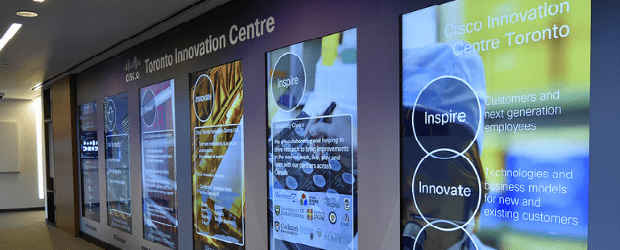TORONTO – The Canadian government smoothed out the process for Thomson Reuters to open a Technology Centre in Canada’s biggest city that is estimated to produce 1,500 IT jobs.
The mass media and information firm announced the expansion of its Canadian operations alongside Prime Minister Justin Trudeau, Ontario Premier Kathleen Wynne, and Toronto Mayor John Tory. The technology centre is expected to initially create 400 technology jobs over the next two years, with ultimate plans for 1,500 jobs.
“Canada is not only our home, it is home to an emerging ecosystem of world-class technology talent,” said Jim Smith, president and CEO of Thomson Reuters. The Toronto-Waterloo Region’s young and diverse workforce continues to attract global attention as it emerges as one of the largest technology clusters in the world. With the Toronto Technology Centre, Thomson Reuters looks to secure roots with this growing ecosystem and allow the company to co-locate technology talent to drive productivity, increase flexibility, and encourage cross-enterprise innovation.
As part of its commitment to Canada and the city of Toronto, Smith and CFO, Stephane Bello, will be relocating to Toronto. “Our new technology centre furthers our commitment to growing Canada’s pre-eminent hub of innovation, and to build the customer-centric platforms and solutions of the future. We applaud the Canadian federal, provincial, and municipal governments for making jobs, innovation, and the knowledge economy a top priority and look forward to our role in supporting these initiatives,” Smith said.
A major influence to returning to Canada has been the effort put forth by the Canadian government to ease Thomson Reuter’s expansion in the country. In an effort to draw top notch global companies who could create jobs for Canadians, Trudeau’s government is demonstrating that Canada is engaged to the world, optimistic about its role within the world, and open to welcoming in people who can contribute and create opportunities for Canadians.
“When drawing in significant global investors in order to create jobs and economic growth in our cities and in our country, we’re always looking to help and encourage to ease the transition by providing various incentives. But in this particular case with Thomson Reuters, they didn’t actually need any tax breaks or incentives or offers of public money. All they needed was help smoothing out the process for the big move up here,” Trudeau said.
Ottawa didn’t give Thomson Reuters any financial incentives, and instead provided assurances that immigration papers and similar red tape issues wouldn’t be a problem.
The Canadian government is always willing to work with companies to find ways to make sure that they can expand in Canada. While there are no plans to remove safeguards or regulations, there is work being made primarily through the Minister of Economic Development and Growth that has boosted coordination across government that makes sure things are not unnecessarily complicated. With coordination across all federal, provincial, and municipal levels, the government can ease the entry for a company like this.
“We lost one of our graduates who was with us for a little while because her visa ran out. Fortunately, we were able to find a home for her in our lab over in London (U.K.), so we didn’t lose her from the company, but we lose her from Canada. When we are trying to grow so quickly, with such skill specializations, we can’t just have people surrendering passports for months at a time.” said Brian Zubert, Director of Thomson Reuters’ Waterloo Lab when speaking to CDN.
“The approaches made by the government are trying to make immigration more accessible for highly-skilled workers, so situations like this never happen again,” Zubert said, indicating how important a better immigration system is to attracting highly-skilled talent to Canada’s tech sector, and the steps the government has begun taking to start to fix that.
Both the government of Canada and Thomson Reuters want the same thing: to put Canada on the map as a global hub for innovation, create good, well-paying jobs, and to grow the local and national economy. Attracting a global company like Thomson Reuters is just the beginning for this growing Canadian ecosystem.
“Today’s news is an example of how great things can happen when the public and private spheres work together – for the betterment of Canadian works, and Canadian families,” Trudeau said.





